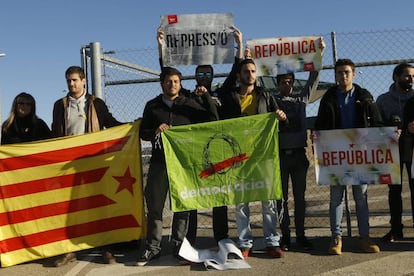A tense campaign
Citizen mobilization is key to ending the victimhood promoted by Catalan separatists

The beginning of the Catalan campaign race, which has only just got underway, has coincided with a judicial ruling to keep four leading figures of the independence process in pre-trial custody; three of them are also candidates for the December 21 vote.
Supreme Court judge Pablo Llarena has released six of the former ministers of the Catalan government of Carles Puigdemont on the basis that there was no indication they would either destroy evidence, repeat their offenses, or flee from justice. But pre-trial custody was maintained for former Catalan deputy premier Oriol Junqueras, former interior minister Joaquim Forn and the two activists Jordi Sànchez and Jordi Cuixart, known in Spain as the two Jordis.
It is important to respect the different speeds and the autonomy of politics and the judiciary
Of course, besides being respected and complied with, the ruling also allows room for disagreement. But those who insult the Spanish courts by denying that they are independent lack any legitimacy.
In the cases of the pro-independence figures now set to remain in pre-trial custody, the judge ruled that while there was no risk of destruction of evidence, there was a flight risk, although this has now diminished. However, he gave little weight to promises made by the four prisoners that they would act legally from now on, given their leading role in the management of the Catalan independence process, their involvement in the organization of civil unrest, and their responsibility in the siege – classified as violent – on September 20 outside the Catalan department of economic affairs in Barcelona.
Well-intentioned critics will recognize the comprehensive nature of the writ, which is neither improvised nor automatic. The spelling out of the individual involvement of each of the participants is also clear to see, while the comprehensive construction of the case dispels any inkling of judicial small-mindedness.
Even so, it will be necessary to further detail the accusation of violence – whether its consequences were personal or material, and whether intimidation was also involved. And it will be necessary to act accordingly if, as the judge himself accepts, there is evidence that “gradually it is being confirmed that the change of spirit [toward respect for the law on the part of the prisoners] is true and real.”
An ever-growing number of citizens now realize they are the victims of the independence process
It is important to respect the different speeds and the autonomy of politics and the judiciary, even when a ruling of this type can involuntarily complicate the electoral campaign: it complicates it, but doesn’t damage it. The protagonists knew what they were doing, and they could have avoided these consequences. And it would be worse if such serious alleged crimes were left unaddressed just to suit the calendar.
The campaign is beginning with other highly relevant figures. One of these is the fact that the independence process has seen jobs destroyed in Catalonia while the rest of the country has created net employment. This is grave news that the former government that proclaimed the so-called independent republic must be held accountable for.
At the same time, according to a poll published by the Spanish government research institute CIS, this painful state of affairs is pushing up voting intention figures and suggesting possibilities of victory for parties that want to recover the political, economic and social normalcy lost in the drive toward secession. The independence movement wants to talk about prisons, promote victimhood and ignore the damage it has done. But it seems that an ever-growing number of citizens now realize they are the victims of the independence process, and feel the urgent need to end it.
English version by George Mills.
Tu suscripción se está usando en otro dispositivo
¿Quieres añadir otro usuario a tu suscripción?
Si continúas leyendo en este dispositivo, no se podrá leer en el otro.
FlechaTu suscripción se está usando en otro dispositivo y solo puedes acceder a EL PAÍS desde un dispositivo a la vez.
Si quieres compartir tu cuenta, cambia tu suscripción a la modalidad Premium, así podrás añadir otro usuario. Cada uno accederá con su propia cuenta de email, lo que os permitirá personalizar vuestra experiencia en EL PAÍS.
¿Tienes una suscripción de empresa? Accede aquí para contratar más cuentas.
En el caso de no saber quién está usando tu cuenta, te recomendamos cambiar tu contraseña aquí.
Si decides continuar compartiendo tu cuenta, este mensaje se mostrará en tu dispositivo y en el de la otra persona que está usando tu cuenta de forma indefinida, afectando a tu experiencia de lectura. Puedes consultar aquí los términos y condiciones de la suscripción digital.








































